
Wes Vernon
The "greatest" - - and "worst" - - presidents
Rethinking the presidential rating game
By Wes Vernon
The trouble with many of the past ratings of America's presidents is that the "consensus" has been arrived at by academics who act alike, do alike, and think alike. In the view of many, they are suspect of viewing history exclusively through the prism of Ivy League faculty lounge discourse.
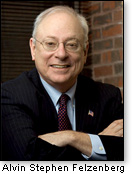 Alvin Stephen Felzenberg (Ph.D.) — who has taken a fresh and comprehensive look at the nation's chief executives in his book The Leaders We Deserved (and a Few We Didn't): Rethinking the Presidential Rating Game — does not challenge the credentials of the conventional historians.
Alvin Stephen Felzenberg (Ph.D.) — who has taken a fresh and comprehensive look at the nation's chief executives in his book The Leaders We Deserved (and a Few We Didn't): Rethinking the Presidential Rating Game — does not challenge the credentials of the conventional historians.
Rather, as he explains in an e-mail to this column, he does challenge "their failure to define terms and inconsistencies in their grading" — i.e, What makes a president great? That he got his program enacted into law? Or that his programs proved beneficial to the country?
Dr. Felzenberg notes in his book that former Sen. Paul Simon (D-Ill.) and former Gov. Mario Cuomo (D-N.Y.) have participated in these "rating presidents" exercises without an identifiable former public official from the other end of the spectrum, "who might have been included for philosophical balance." He suggests that William Bennett, Newt Gingrich, George Schultz, the late Jean Kirkpatrick, and Milton Friedman — all with Ph.D.s — would have been credible contributors.
Revisionist?
Call it "revisionism" if you will — a term often intended as a pejorative — but as time advances and new perspectives and new information come into play, honest history requires openness to "revisionism." Moreover, as repeatedly noted here, "history" is usually written by the winners, not the losers. At times, events and outcomes sometimes have a way of ultimately proving the losers right, while the verdict of "history" fails to adjust accordingly.
FDR
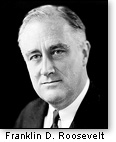 Felzenberg tells me, for example, "Most polls put FDR in third place right after Abe and George. I commit the great outrage of dropping him to sixth," while noting that Roosevelt himself told an aide that with war clouds on the horizon, he might have to run for a third term to "rescue his reputation." His second term (attempting to pack the Supreme Court and failing to end the Great Depression) was arguably a disaster.
Felzenberg tells me, for example, "Most polls put FDR in third place right after Abe and George. I commit the great outrage of dropping him to sixth," while noting that Roosevelt himself told an aide that with war clouds on the horizon, he might have to run for a third term to "rescue his reputation." His second term (attempting to pack the Supreme Court and failing to end the Great Depression) was arguably a disaster.
Felzenberg gives FDR due credit as Commander-in-Chief in World War II. The 32nd president's detractors would cite his failure to recognize the Soviet danger toward the end of that conflict and, for that matter, his failure to recognize Stalin as anything more than a not-to-be-trusted ally of convenience during the war. Missteps at Yalta and Tehran, they argue, brought on the Cold War, and would merit Roosevelt an even lower place in history. But Dr. Felzenberg's willingness to dissent from the total sainthood usually bestowed on Franklin Roosevelt strikes a long-overdue blow for objective history.
Lincoln, Grant, and Kemp
Last week, we pondered how the political map of the late 19th and entire 20th centuries would have been drawn if Abraham Lincoln — who rates Number 1 in Felzenberg's listing — had survived the assassin's bullet very early in his second term. I asked Felzenberg: Would a bi-racial South in Congress have led to a "civil rights" movement of the good will proclaimed in Lincoln's "malice toward none" speech and the good cheer exuded in the last years of the 20th century by the just-departed Jack Kemp — and less of the Marxist rebellion personified by the likes of W.E.B Dubois?
Dr. Felzenberg says that analysis is "dead right" and adds, "Several years ago, Jack Kemp telephoned to ask about President [Ulysses] Grant. I replied that in many ways, Old Ulysses was the Jack Kemp of the 19th century. Grant believed that the goals of the [Civil] war" would become reality once peace had been achieved. "That meant treating [and] granting all people the same rights as individuals. He insisted on passage of the 15th [voting rights] amendment before he agreed to the presidency."
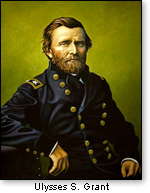 Grant took several steps to provide a better path for former slaves, but Felzenberg believes Andrew Johnson — who directly succeeded Lincoln — failed to continue Lincoln's approach — which meant "the damage had already been done" by the time Grant moved to the White House.
Grant took several steps to provide a better path for former slaves, but Felzenberg believes Andrew Johnson — who directly succeeded Lincoln — failed to continue Lincoln's approach — which meant "the damage had already been done" by the time Grant moved to the White House.
This is a classic example of how "history" evolves. When I was a kid in school, we were taught that Andrew Johnson tried to "moderate" the extremes of unreconstructed Southerners and "radical Republicans" of the Thaddeus Stevens ilk, and that this unjustly led to Johnson's impeachment (on an issue not directly related to reconstruction). I remember seeing that pro-Johnson argument dramatized in the movie Tennessee Johnson.
We were also taught that Grant was a failure mainly because of scandals that plagued his administration. Dr. Felzenberg points out that the scandals in Grant's era were small potatoes — certainly by today's standards — and included matters largely beyond his control.
The Leaders We Deserved thus rates Lincoln Number 1 — in sync with conventional historians — but rates Grant (tied with four others) at Number 7 (tied with Taylor, Truman, McKinley, and Kennedy) — at odds with the view of conventional historians, who place him far down the list. However, Felzenberg's book may have influenced the cause of honest history. He notes in his e-mail to us that "in C-SPAN's poll of historians released on President's Day, Grant shot up considerably."
In Felzenberg's rating, Andrew Johnson ends up at Number 37 — just barely ahead of Lincoln's immediate predecessor James Buchanan (dead last), whose policies are deemed to have contributed to the Civil War and whom Felzenberg sees as "a blockhead."
44 presidents: why only 38 numbered?
The Leaders We Deserved numbers fewer ratings than presidents. The reasons: Bush 43 had not completed his White House tenure when the book was written and, of course Obama had not yet been elected. William Henry Harrison served just one month before he died. Grover Cleveland served two non-consecutive terms, and there are some ties throughout the chart.
Why Taylor?
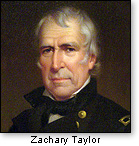 Zachary Taylor is one of five presidents tied at Number 7 largely because Felzenberg sees him as a visionary who — had he not died 16 months into his presidency (1850) — likely would have prevented the Civil War that came 11 years later.
Zachary Taylor is one of five presidents tied at Number 7 largely because Felzenberg sees him as a visionary who — had he not died 16 months into his presidency (1850) — likely would have prevented the Civil War that came 11 years later.
Taylor supported admitting California and New Mexico to the union as free (non-slave) states and opposed the harsh fugitive slave law.
To quote this fresh look at history: "Taylor took these stands in full knowledge that admitting new free states would permanently alter the political balance in Congress and the Electoral College and that in time Congress and the states could pass a constitutional amendment abolishing slavery where it already existed," which "would have spared the lives of 620,000 Americans" who died in the war, and also avoided "a century's legacy of sectional bitterness." While only a very determined president could have pulled that off, Felzenberg says at the time of his death, Taylor "was showing every sign of evolving into such a president."
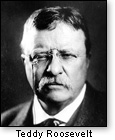 Teddy Roosevelt — right behind Abe and George?
Teddy Roosevelt — right behind Abe and George?
Felzenberg rates Theodore Roosevelt (Republican and distant cousin to the Democrat Roosevelt of three decades later) in the Number 3 slot.
I questioned this because Roosevelt was identified with the misnamed "progressive" movement of his day, later amplified by Woodrow Wilson and ultimately brought into full bloom by FDR.
In response, Alvin Felzenberg e-mails the following: "I think it is important to distinguish TR the president from TR the presidential aspirant of 1912. As president, he brought no new entitlements and attempted no economic redistribution.... What this Roosevelt could be accused of was arbitrariness." And this: "As [Teddy] Roosevelt by 1914 backed away from most of what he ran on in 1912 [as a 3rd party 'Bull Moose/Progressive'], it is hard to know what he would have done had he defeated Wilson" — but "Wilson ushered in the modern administrative, regulatory, and other bureaucracies we have lived with [and been taxed for — W.V.] ever since."
Wilson
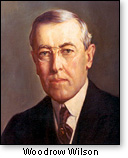 This column sees Woodrow Wilson as probably the most arrogant, self-righteous president we've ever had. Without meaning to put words in Felzenberg's mouth, nothing in The Leaders We Deserved disabuses me of that notion.
This column sees Woodrow Wilson as probably the most arrogant, self-righteous president we've ever had. Without meaning to put words in Felzenberg's mouth, nothing in The Leaders We Deserved disabuses me of that notion.
Not only for the growth of government on his watch (as noted above), but also because his "make the world safe for democracy" crusade to involve us in World War I made us a party to a conflict that contributed mightily to all the worldwide 20th century disasters that followed — including Lenin, Stalin, and ultimately Hitler. The Versailles Treaty — which Wilson championed — rightly failed Senate ratification, in part because public opinion rejected Wilson's admonition that the U.S. had a "moral obligation" to surrender some of its sovereignty. The pact was nothing but a victor's revenge treaty that handed Hitler his talking points on a silver platter.
One Felzenberg focus is that Wilson's holier-than-thou stubbornness prevented him from making a reasonable compromise with Senator Henry Cabot Lodge, the treaty's leading opponent on Capitol Hill. That clearly demonstrates the haughty nastiness of Woodrow Wilson, but it is probably just as well that he and Lodge didn't strike a deal. The treaty was badly flawed.
On "civil rights," Wilson's disrespect for black people — while not of the Theodore Bilbo crudity — was blatant. He undid, reversed, or ignored the efforts on the part of his Republican predecessors in that area.
Jackson
For today's Democrats, Andrew Jackson shares with Thomas Jefferson the annual honors each year in fundraising Jefferson-Jackson Day dinners. They can have him.
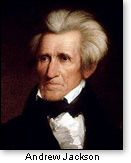 "Andrew Jackson carried into office with him a host of prejudices and resentments he had nurtured over a lifetime. It is the nation's misfortune that, as president, he nurtured so many of them," writes Alvin Felzenberg.
"Andrew Jackson carried into office with him a host of prejudices and resentments he had nurtured over a lifetime. It is the nation's misfortune that, as president, he nurtured so many of them," writes Alvin Felzenberg.
(In more modern times, the same has been said of Richard Nixon and Barack Hussein Obama, but that's a "sidebar" to the current discussion.)
"The totality of Jackson's inconsistent and often irrational policies — often the products of personal pique" — led to "the Panic of 1837 and a subsequent depression."
"Old Hickory" hated banks per se (was ignorant as to how they worked) and had a disdain for Indians — or Native Americans, as they are known today. When businessmen facing ruin asked for help, Jackson told them that the reason for his war against the Second Bank of the U.S. was to settle a political grudge match.
Conventional historians have rated Jackson as "near great" based in large part on Old Hickory's populist rhetoric, Felzenberg believes, without due consideration for the actual merits or results of his policies.
Jefferson and Madison
Thomas Jefferson is tied at 14 with Adams (John and John Quincy), Wilson, and Bush 41). Felzenberg agrees with a biographer's description of Jefferson as "an American sphinx" — i.e., inscrutable/not easily understood.
 There were warning signs of Jefferson's character before he entered the White House. As Washington's Secretary of State, he undermined the man he was working for — both in policy issues and in personal terms — and then denied doing exactly what he had done. Like some modern-day successors, he divided the world into "rogues" (those who disagreed with him and "honest men" (those in the tank for him).
There were warning signs of Jefferson's character before he entered the White House. As Washington's Secretary of State, he undermined the man he was working for — both in policy issues and in personal terms — and then denied doing exactly what he had done. Like some modern-day successors, he divided the world into "rogues" (those who disagreed with him and "honest men" (those in the tank for him).
As president, he tried to assert America's "neutrality" in a British/French war by imposing an embargo on both sides. He ignored his treasury secretary's warning this would only harm the U.S. economy, and when that very thing happened, he intensified the embargo "through Draconian means."
During his final months in office, Jefferson "all but ceased being president.... While Jefferson did not resign his post, he might just as well have."
And his successor? James Madison waded into the War of 1812 with Britain without any organization or the wherewithal to finish the job. The result was the Brit's whack at the metaphorical glass jaw that couldn't be missed.
Both Jefferson and Madison are always to be honored for their roles as Founding Fathers, but their presidencies? Jefferson's was mediocre at best (tied at 14) and Madison (at 29) — arguably a disaster.
So where is Ronnie?
Ronald Reagan comes in at Number 3 — tied with Teddy Roosevelt. Reagan is in Felzenberg's top tier for all the well-known, obvious reasons — ending the Cold War and ushering in a quarter century of a roaring economy (with minor bumps in the road), until late 2008 going like gangbusters. He knew exactly what he wanted to do, he did it, and it was of great benefit to the nation.
Summing it up
Alvin Stephen Felzenberg has brought forward so much impeccable scholarship that The Leaders We Deserved (and a Few We Didn't) merits the Gold Star Seal for rating presidents. As of now, it is the yardstick.
No two people will agree with every crossed t or dotted i in his analysis. That in no way serves as a blemish on this thorough and honest piece of work.
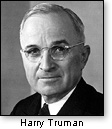 On Truman, we would have dropped him down some notches mainly because, though the man from Independence was viscerally anti-communist, on the issue of China some of the wrong people had his ear — i.e., the Euro-centric Dean Acheson. And there were others whose writings (directly or indirectly) provided him with disastrous input — i.e., the pro-Red Chinese Owen Lattimore. This was a failure we live with to this day, both militarily and economically. But that is an honest difference of opinion.
On Truman, we would have dropped him down some notches mainly because, though the man from Independence was viscerally anti-communist, on the issue of China some of the wrong people had his ear — i.e., the Euro-centric Dean Acheson. And there were others whose writings (directly or indirectly) provided him with disastrous input — i.e., the pro-Red Chinese Owen Lattimore. This was a failure we live with to this day, both militarily and economically. But that is an honest difference of opinion.
One is entitled to his own opinion, but not his own facts. And Felzenberg's substantive facts are airtight.
Felzenberg's best presidents in order (some tied with each other) — Lincoln, Washington, Teddy Roosevelt, Reagan, Eisenhower, Franklin Roosevelt, Taylor, Grant, McKinley, Truman, Kennedy.
This column's "hit parade" — Washington, Lincoln, Reagan, Taylor, Coolidge, McKinley, Grant, Cleveland (last Dem. conservative president.). Honorable mention is JFK — tax-cutter, handler of the Cuban missile crisis, and the last Cold War Kennedy.
© Wes Vernon
May 11, 2009
The trouble with many of the past ratings of America's presidents is that the "consensus" has been arrived at by academics who act alike, do alike, and think alike. In the view of many, they are suspect of viewing history exclusively through the prism of Ivy League faculty lounge discourse.
 Alvin Stephen Felzenberg (Ph.D.) — who has taken a fresh and comprehensive look at the nation's chief executives in his book The Leaders We Deserved (and a Few We Didn't): Rethinking the Presidential Rating Game — does not challenge the credentials of the conventional historians.
Alvin Stephen Felzenberg (Ph.D.) — who has taken a fresh and comprehensive look at the nation's chief executives in his book The Leaders We Deserved (and a Few We Didn't): Rethinking the Presidential Rating Game — does not challenge the credentials of the conventional historians.Rather, as he explains in an e-mail to this column, he does challenge "their failure to define terms and inconsistencies in their grading" — i.e, What makes a president great? That he got his program enacted into law? Or that his programs proved beneficial to the country?
Dr. Felzenberg notes in his book that former Sen. Paul Simon (D-Ill.) and former Gov. Mario Cuomo (D-N.Y.) have participated in these "rating presidents" exercises without an identifiable former public official from the other end of the spectrum, "who might have been included for philosophical balance." He suggests that William Bennett, Newt Gingrich, George Schultz, the late Jean Kirkpatrick, and Milton Friedman — all with Ph.D.s — would have been credible contributors.
Revisionist?
Call it "revisionism" if you will — a term often intended as a pejorative — but as time advances and new perspectives and new information come into play, honest history requires openness to "revisionism." Moreover, as repeatedly noted here, "history" is usually written by the winners, not the losers. At times, events and outcomes sometimes have a way of ultimately proving the losers right, while the verdict of "history" fails to adjust accordingly.
FDR
 Felzenberg tells me, for example, "Most polls put FDR in third place right after Abe and George. I commit the great outrage of dropping him to sixth," while noting that Roosevelt himself told an aide that with war clouds on the horizon, he might have to run for a third term to "rescue his reputation." His second term (attempting to pack the Supreme Court and failing to end the Great Depression) was arguably a disaster.
Felzenberg tells me, for example, "Most polls put FDR in third place right after Abe and George. I commit the great outrage of dropping him to sixth," while noting that Roosevelt himself told an aide that with war clouds on the horizon, he might have to run for a third term to "rescue his reputation." His second term (attempting to pack the Supreme Court and failing to end the Great Depression) was arguably a disaster.Felzenberg gives FDR due credit as Commander-in-Chief in World War II. The 32nd president's detractors would cite his failure to recognize the Soviet danger toward the end of that conflict and, for that matter, his failure to recognize Stalin as anything more than a not-to-be-trusted ally of convenience during the war. Missteps at Yalta and Tehran, they argue, brought on the Cold War, and would merit Roosevelt an even lower place in history. But Dr. Felzenberg's willingness to dissent from the total sainthood usually bestowed on Franklin Roosevelt strikes a long-overdue blow for objective history.
Lincoln, Grant, and Kemp
Last week, we pondered how the political map of the late 19th and entire 20th centuries would have been drawn if Abraham Lincoln — who rates Number 1 in Felzenberg's listing — had survived the assassin's bullet very early in his second term. I asked Felzenberg: Would a bi-racial South in Congress have led to a "civil rights" movement of the good will proclaimed in Lincoln's "malice toward none" speech and the good cheer exuded in the last years of the 20th century by the just-departed Jack Kemp — and less of the Marxist rebellion personified by the likes of W.E.B Dubois?
Dr. Felzenberg says that analysis is "dead right" and adds, "Several years ago, Jack Kemp telephoned to ask about President [Ulysses] Grant. I replied that in many ways, Old Ulysses was the Jack Kemp of the 19th century. Grant believed that the goals of the [Civil] war" would become reality once peace had been achieved. "That meant treating [and] granting all people the same rights as individuals. He insisted on passage of the 15th [voting rights] amendment before he agreed to the presidency."
 Grant took several steps to provide a better path for former slaves, but Felzenberg believes Andrew Johnson — who directly succeeded Lincoln — failed to continue Lincoln's approach — which meant "the damage had already been done" by the time Grant moved to the White House.
Grant took several steps to provide a better path for former slaves, but Felzenberg believes Andrew Johnson — who directly succeeded Lincoln — failed to continue Lincoln's approach — which meant "the damage had already been done" by the time Grant moved to the White House.This is a classic example of how "history" evolves. When I was a kid in school, we were taught that Andrew Johnson tried to "moderate" the extremes of unreconstructed Southerners and "radical Republicans" of the Thaddeus Stevens ilk, and that this unjustly led to Johnson's impeachment (on an issue not directly related to reconstruction). I remember seeing that pro-Johnson argument dramatized in the movie Tennessee Johnson.
We were also taught that Grant was a failure mainly because of scandals that plagued his administration. Dr. Felzenberg points out that the scandals in Grant's era were small potatoes — certainly by today's standards — and included matters largely beyond his control.
The Leaders We Deserved thus rates Lincoln Number 1 — in sync with conventional historians — but rates Grant (tied with four others) at Number 7 (tied with Taylor, Truman, McKinley, and Kennedy) — at odds with the view of conventional historians, who place him far down the list. However, Felzenberg's book may have influenced the cause of honest history. He notes in his e-mail to us that "in C-SPAN's poll of historians released on President's Day, Grant shot up considerably."
In Felzenberg's rating, Andrew Johnson ends up at Number 37 — just barely ahead of Lincoln's immediate predecessor James Buchanan (dead last), whose policies are deemed to have contributed to the Civil War and whom Felzenberg sees as "a blockhead."
44 presidents: why only 38 numbered?
The Leaders We Deserved numbers fewer ratings than presidents. The reasons: Bush 43 had not completed his White House tenure when the book was written and, of course Obama had not yet been elected. William Henry Harrison served just one month before he died. Grover Cleveland served two non-consecutive terms, and there are some ties throughout the chart.
Why Taylor?
 Zachary Taylor is one of five presidents tied at Number 7 largely because Felzenberg sees him as a visionary who — had he not died 16 months into his presidency (1850) — likely would have prevented the Civil War that came 11 years later.
Zachary Taylor is one of five presidents tied at Number 7 largely because Felzenberg sees him as a visionary who — had he not died 16 months into his presidency (1850) — likely would have prevented the Civil War that came 11 years later.Taylor supported admitting California and New Mexico to the union as free (non-slave) states and opposed the harsh fugitive slave law.
To quote this fresh look at history: "Taylor took these stands in full knowledge that admitting new free states would permanently alter the political balance in Congress and the Electoral College and that in time Congress and the states could pass a constitutional amendment abolishing slavery where it already existed," which "would have spared the lives of 620,000 Americans" who died in the war, and also avoided "a century's legacy of sectional bitterness." While only a very determined president could have pulled that off, Felzenberg says at the time of his death, Taylor "was showing every sign of evolving into such a president."
 Teddy Roosevelt — right behind Abe and George?
Teddy Roosevelt — right behind Abe and George?Felzenberg rates Theodore Roosevelt (Republican and distant cousin to the Democrat Roosevelt of three decades later) in the Number 3 slot.
I questioned this because Roosevelt was identified with the misnamed "progressive" movement of his day, later amplified by Woodrow Wilson and ultimately brought into full bloom by FDR.
In response, Alvin Felzenberg e-mails the following: "I think it is important to distinguish TR the president from TR the presidential aspirant of 1912. As president, he brought no new entitlements and attempted no economic redistribution.... What this Roosevelt could be accused of was arbitrariness." And this: "As [Teddy] Roosevelt by 1914 backed away from most of what he ran on in 1912 [as a 3rd party 'Bull Moose/Progressive'], it is hard to know what he would have done had he defeated Wilson" — but "Wilson ushered in the modern administrative, regulatory, and other bureaucracies we have lived with [and been taxed for — W.V.] ever since."
Wilson
 This column sees Woodrow Wilson as probably the most arrogant, self-righteous president we've ever had. Without meaning to put words in Felzenberg's mouth, nothing in The Leaders We Deserved disabuses me of that notion.
This column sees Woodrow Wilson as probably the most arrogant, self-righteous president we've ever had. Without meaning to put words in Felzenberg's mouth, nothing in The Leaders We Deserved disabuses me of that notion.Not only for the growth of government on his watch (as noted above), but also because his "make the world safe for democracy" crusade to involve us in World War I made us a party to a conflict that contributed mightily to all the worldwide 20th century disasters that followed — including Lenin, Stalin, and ultimately Hitler. The Versailles Treaty — which Wilson championed — rightly failed Senate ratification, in part because public opinion rejected Wilson's admonition that the U.S. had a "moral obligation" to surrender some of its sovereignty. The pact was nothing but a victor's revenge treaty that handed Hitler his talking points on a silver platter.
One Felzenberg focus is that Wilson's holier-than-thou stubbornness prevented him from making a reasonable compromise with Senator Henry Cabot Lodge, the treaty's leading opponent on Capitol Hill. That clearly demonstrates the haughty nastiness of Woodrow Wilson, but it is probably just as well that he and Lodge didn't strike a deal. The treaty was badly flawed.
On "civil rights," Wilson's disrespect for black people — while not of the Theodore Bilbo crudity — was blatant. He undid, reversed, or ignored the efforts on the part of his Republican predecessors in that area.
Jackson
For today's Democrats, Andrew Jackson shares with Thomas Jefferson the annual honors each year in fundraising Jefferson-Jackson Day dinners. They can have him.
 "Andrew Jackson carried into office with him a host of prejudices and resentments he had nurtured over a lifetime. It is the nation's misfortune that, as president, he nurtured so many of them," writes Alvin Felzenberg.
"Andrew Jackson carried into office with him a host of prejudices and resentments he had nurtured over a lifetime. It is the nation's misfortune that, as president, he nurtured so many of them," writes Alvin Felzenberg.(In more modern times, the same has been said of Richard Nixon and Barack Hussein Obama, but that's a "sidebar" to the current discussion.)
"The totality of Jackson's inconsistent and often irrational policies — often the products of personal pique" — led to "the Panic of 1837 and a subsequent depression."
"Old Hickory" hated banks per se (was ignorant as to how they worked) and had a disdain for Indians — or Native Americans, as they are known today. When businessmen facing ruin asked for help, Jackson told them that the reason for his war against the Second Bank of the U.S. was to settle a political grudge match.
Conventional historians have rated Jackson as "near great" based in large part on Old Hickory's populist rhetoric, Felzenberg believes, without due consideration for the actual merits or results of his policies.
Jefferson and Madison
Thomas Jefferson is tied at 14 with Adams (John and John Quincy), Wilson, and Bush 41). Felzenberg agrees with a biographer's description of Jefferson as "an American sphinx" — i.e., inscrutable/not easily understood.
 There were warning signs of Jefferson's character before he entered the White House. As Washington's Secretary of State, he undermined the man he was working for — both in policy issues and in personal terms — and then denied doing exactly what he had done. Like some modern-day successors, he divided the world into "rogues" (those who disagreed with him and "honest men" (those in the tank for him).
There were warning signs of Jefferson's character before he entered the White House. As Washington's Secretary of State, he undermined the man he was working for — both in policy issues and in personal terms — and then denied doing exactly what he had done. Like some modern-day successors, he divided the world into "rogues" (those who disagreed with him and "honest men" (those in the tank for him).As president, he tried to assert America's "neutrality" in a British/French war by imposing an embargo on both sides. He ignored his treasury secretary's warning this would only harm the U.S. economy, and when that very thing happened, he intensified the embargo "through Draconian means."
During his final months in office, Jefferson "all but ceased being president.... While Jefferson did not resign his post, he might just as well have."
And his successor? James Madison waded into the War of 1812 with Britain without any organization or the wherewithal to finish the job. The result was the Brit's whack at the metaphorical glass jaw that couldn't be missed.
Both Jefferson and Madison are always to be honored for their roles as Founding Fathers, but their presidencies? Jefferson's was mediocre at best (tied at 14) and Madison (at 29) — arguably a disaster.
So where is Ronnie?
Ronald Reagan comes in at Number 3 — tied with Teddy Roosevelt. Reagan is in Felzenberg's top tier for all the well-known, obvious reasons — ending the Cold War and ushering in a quarter century of a roaring economy (with minor bumps in the road), until late 2008 going like gangbusters. He knew exactly what he wanted to do, he did it, and it was of great benefit to the nation.
Summing it up
Alvin Stephen Felzenberg has brought forward so much impeccable scholarship that The Leaders We Deserved (and a Few We Didn't) merits the Gold Star Seal for rating presidents. As of now, it is the yardstick.
No two people will agree with every crossed t or dotted i in his analysis. That in no way serves as a blemish on this thorough and honest piece of work.
 On Truman, we would have dropped him down some notches mainly because, though the man from Independence was viscerally anti-communist, on the issue of China some of the wrong people had his ear — i.e., the Euro-centric Dean Acheson. And there were others whose writings (directly or indirectly) provided him with disastrous input — i.e., the pro-Red Chinese Owen Lattimore. This was a failure we live with to this day, both militarily and economically. But that is an honest difference of opinion.
On Truman, we would have dropped him down some notches mainly because, though the man from Independence was viscerally anti-communist, on the issue of China some of the wrong people had his ear — i.e., the Euro-centric Dean Acheson. And there were others whose writings (directly or indirectly) provided him with disastrous input — i.e., the pro-Red Chinese Owen Lattimore. This was a failure we live with to this day, both militarily and economically. But that is an honest difference of opinion.One is entitled to his own opinion, but not his own facts. And Felzenberg's substantive facts are airtight.
Felzenberg's best presidents in order (some tied with each other) — Lincoln, Washington, Teddy Roosevelt, Reagan, Eisenhower, Franklin Roosevelt, Taylor, Grant, McKinley, Truman, Kennedy.
This column's "hit parade" — Washington, Lincoln, Reagan, Taylor, Coolidge, McKinley, Grant, Cleveland (last Dem. conservative president.). Honorable mention is JFK — tax-cutter, handler of the Cuban missile crisis, and the last Cold War Kennedy.
© Wes Vernon
The views expressed by RenewAmerica columnists are their own and do not necessarily reflect the position of RenewAmerica or its affiliates.
(See RenewAmerica's publishing standards.)


















